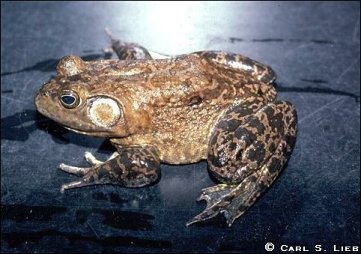

When it comes to the environment, humans, as a group, are notoriously short sighted. Witness the many introductions of exotic animals and plants that later cause havoc to the natural ecosystems. In the early days of the republic, ignorance may have been a reasonable excuse. But with our increased biological knowledge, lack of foresight is no longer acceptable.
Among damaging introductions into our Chihuahuan Desert is the Bullfrog. Although possibly native to the easternmost parts, most of its range in the desert waterlands is due to releases, presumably for sport and food. It now is widespread in at least the northern reaches.
Unfortunately, Bullfrogs will eat almost anything, including
salamanders, frogs, snakes, turtles, bats, rodents, and birds, along with a variety of
invertebrates ranging from crayfish to snails to moths. Introduction into new waters
increases pressure on the native inhabitants, with the Bullfrog implicated in the
decline or loss of various wetland creatures. In one instance, introduction into parts
of the Rio Casas Grandes drainage resulted in complete loss of other frogs, snakes, and
small turtles.

Contributor: Arthur H. Harris, Laboratory for Environmental Biology, Centennial Museum, University of Texas at El Paso.
Desert Diary is a joint production of the Centennial Museum and KTEP National Public Radio at the University of Texas at El Paso.

Bullfrog (Rana catesbiana. Photograph by Carl S. Lieb.
Conant, R. 1977. Semiaquatic reptiles and amphibians of the Chihuahuan Desert and their relationships to drainage patterns of the region. Pp. 455-491, in R. H. Wauer and D. H. Riskind (eds.). Transactions of the symposium on the biological resources of the Chihuahuan Desert Region, United States and Mexico. National Park Service, Transactions and Proceedings Series, 3:1-658.
Degenhardt, W. G., C. W. Painter, and A. H. Price. 1996. Amphibians and reptiles of New Mexico. University of New Mexico Press, Albuquerque, 431 pp.
Animal Bytes, Bullfrog.